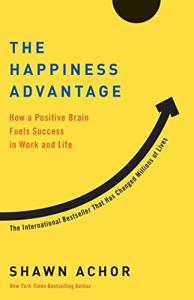
Want to learn the ideas in The Happiness Advantage better than ever? Read the world’s #1 book summary of The Happiness Advantage by Shawn Achor here.
Read a brief 1-Page Summary or watch video summaries curated by our expert team. Note: this book guide is not affiliated with or endorsed by the publisher or author, and we always encourage you to purchase and read the full book.
Video Summaries of The Happiness Advantage
We’ve scoured the Internet for the very best videos on The Happiness Advantage, from high-quality videos summaries to interviews or commentary by Shawn Achor.
1-Page Summary of The Happiness Advantage
Overview
The Happiness Advantage is a book by Shawn Achor which explores the link between happiness and success. It’s based on positive psychology, the study of human potential. The author outlines practical steps that can increase your chances for professional advancement.
The first principle of positive psychology is that happiness is the experience of positive emotions combined with deeper feelings of meaning and purpose. This concept has been shown to activate sections in our brains that are responsible for performance, which puts happy people head and shoulders above the competition. Happiness can be fostered through practices such as meditation and exercise, as well as by creating encouragement for members across an organization.
The first principle says that it’s important to know what makes you happy. You should figure out what your goals are and then work towards them. It will help you be happier in the long run, as well as more successful at whatever career choice you choose to pursue. The second principle is about believing in yourself and being confident in your own abilities. If you think positively about yourself, it will make a huge difference on how much happiness and success you have with your job or career path. The third principle says that it’s possible to change the way the brain works by practicing positive thinking techniques over time so that they become habits for life
The fourth principle is that you can use failure to practice positivity. If something bad happens, instead of being negative about it, you should look at the situation in a positive light and move forward.
The fifth principle is that focusing on completing small, achievable tasks can lead to positive feelings and career growth.
The sixth principle is about regulating your energy levels. In order to change bad habits, you can reduce the amount of effort it takes to perform activities that are good for you, like biking or reading. You can also increase the amount of effort it takes to perform activities that are bad for you, such as watching TV or eating junk food.
Social interaction is key to happiness. Creating new relationships and investing in existing ones not only makes us happier but also reduces stress, enhances motivation, and nurtures many other career-boosting traits.
Happiness can spread quickly. If one person is happy, they’ll spread happiness to others who will do the same and so on. An organization that has workers who are positive will be more successful than those with negative people.
Key Point 1: Positive psychology is the scientific study of attributes and activities that enable humans to flourish.
For most of the history of academic psychology, researchers focused on either average behavior or negative behaviors such as substance abuse, anxiety, or depression. This changed in 1998 when Martin Seligman encouraged psychologists to pay more attention to what brings happiness and success.
Over the years, research has emerged that shows that not everyone is equally disposed to reap positive thinking’s benefits. A 2011 article in Scientific American by Scott O. Lilienfeld and Hal Arkowitz explains this, pointing out that people who are defensive pessimists—those who habitually lower their expectations and prepare for the worst—do better when they have a negative outlook because it helps them manage anxiety. A study cited in the article found that these people were less likely to be depressed after undergoing a negative experience because they were already prepared for it.
A study by Lilienfeld and Arkowitz showed that people who are overly positive in their outlook on life tend to be less successful than those who have a more modestly positive outlook. The study found that moderately happy people enjoy greater success in education, career, finance and politics. However, very happy people do better with intimate relationships and volunteer work.





